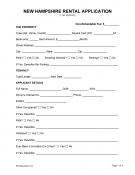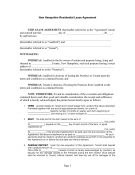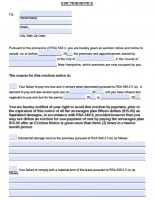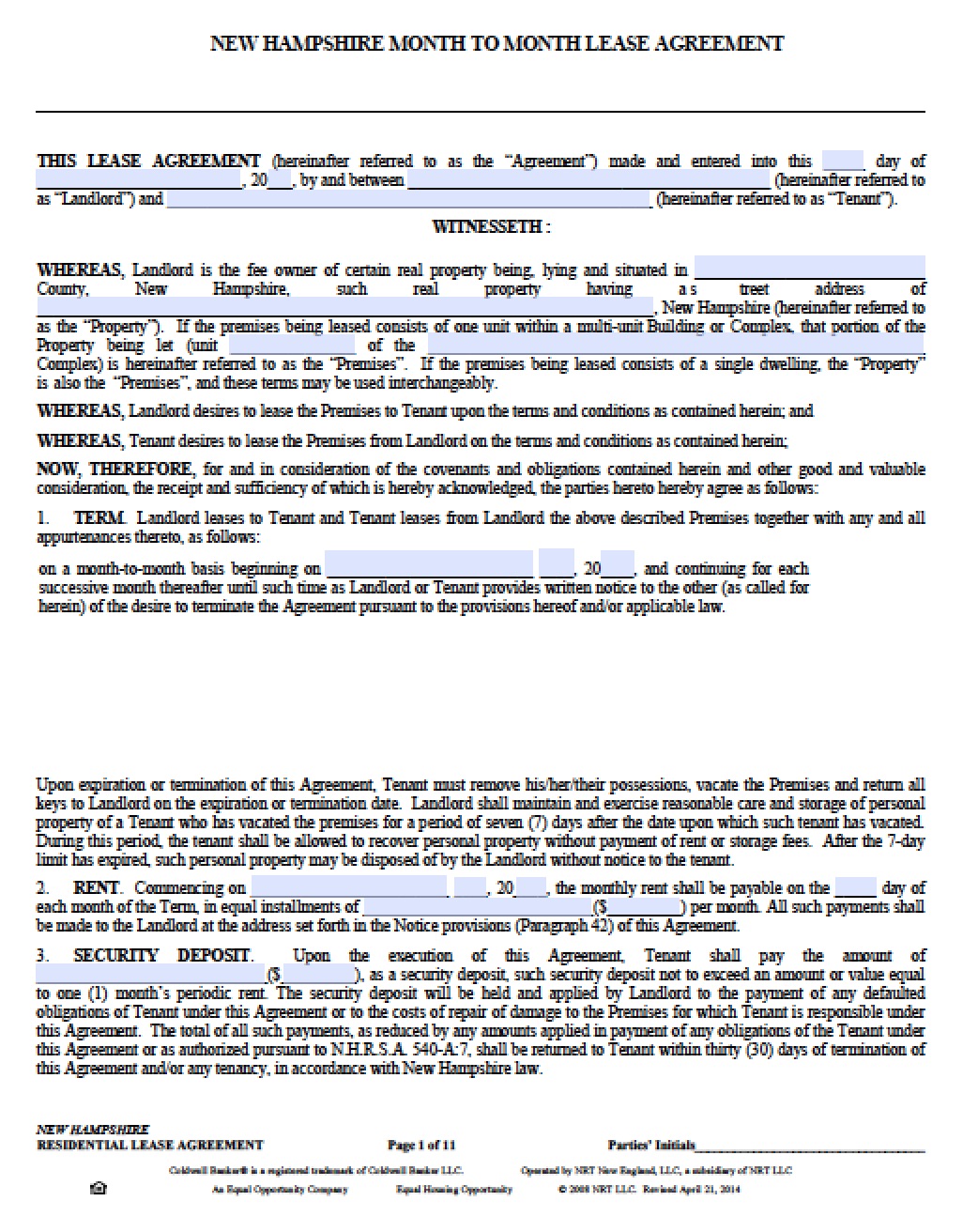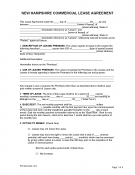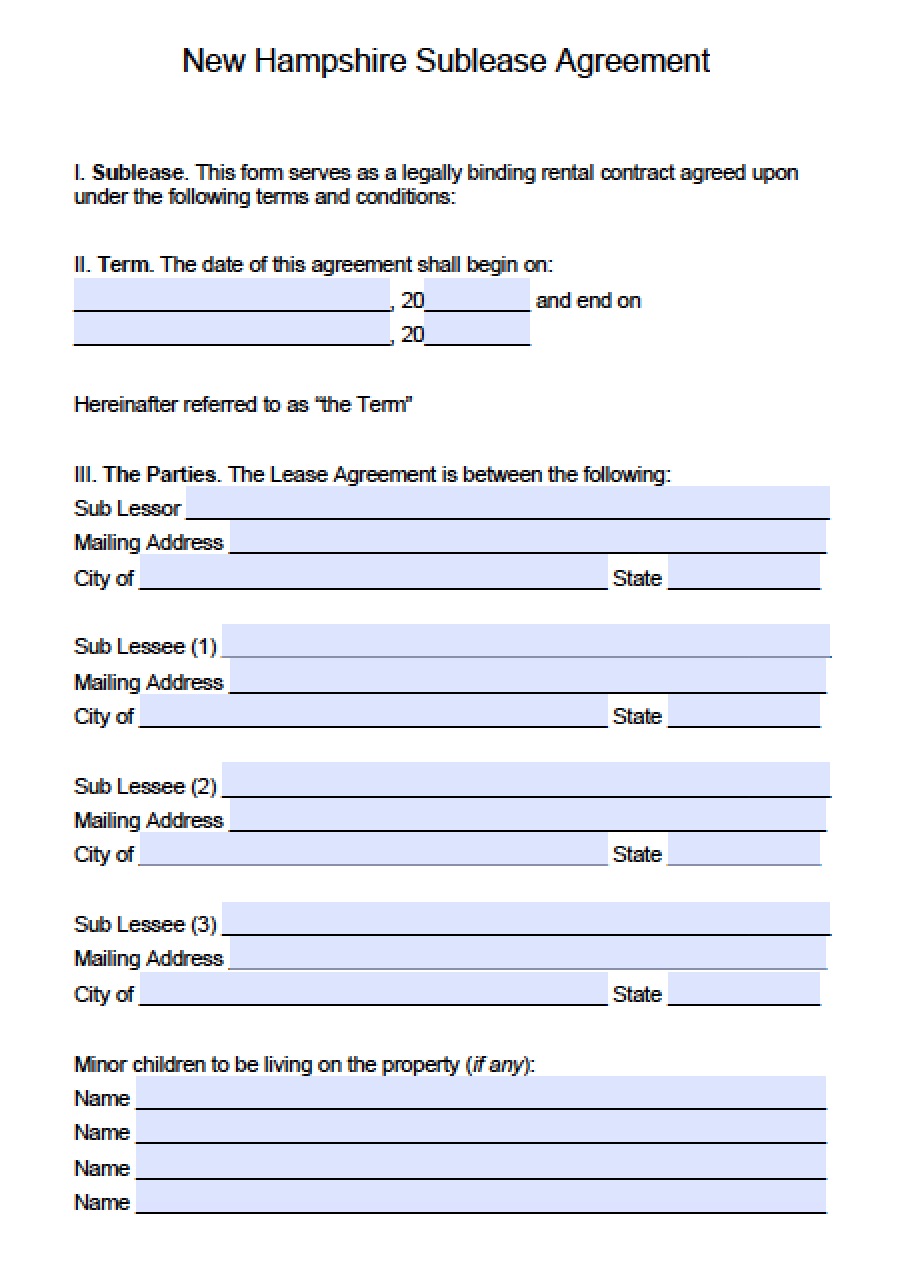The New Hampshire rental agreements allow a landlord and tenant to establish the basic terms and conditions associated with the leasing of a commercial or residential property. The party occupying the space (the lessee) will rent the property for a period of time in exchange for payment which is usually made on the first (1st) of every month. Once a tenant shows interest in a property, the landlord or their representative will typically ask the applicant to complete a rental application to confirm their credentials. If approved, a security deposit may be requested and the lease shall be written.
New Hampshire Rental Lease Agreement Templates | PDF
New Hampshire Lease Agreements
The New Hampshire rental application is a tool used by landlords to check the credit and background of any potential lessee before authorizing a lease. The landlord is allowed to collect a non-refundable payment for the processing and verification of all credit and background checks. The landlord must make sure that before looking up the credit of the individual, that the applicant signs the bottom acknowledging that they are giving up their rights in order to have the landlord or…
The New Hampshire standard residential lease agreement is a fixed arrangement where an individual pays a monthly amount to a landlord in return for the use of livable space. The payment is usually made on the first (1st) of every month and continues until the end of the term which is most commonly set for one (1) year. This document is usually not signed until a thorough background, reference, and credit check of the potential tenant is conducted. Once an…
The New Hampshire seven (7) day notice to quit for non-payment is served upon a tenant who is currently behind on their monthly payment(s). The notice offers the tenant a choice of either paying the overdue amount or vacating the premises within seven (7) days. Should the tenant choose to neither pay rent or vacate, the landlord will be permitted to cancel their tenancy and file for an eviction in court. The notice to quit must also be served with…
The New Hampshire month-to-month lease agreement allows a landlord and tenant to create a rental contract that does not cancel until notice is issued by one (1) of the parties. Either the landlord or tenant may terminate the agreement by providing at least thirty (30) days’ written notice to the other party (it is recommended that the notice be sent via certified letter with a returned receipt for proof). The landlord or tenant may also provide the same amount of…
A New Hampshire commercial lease agreement is reserved for tenants of retail, office, or industrial space seeking a long or fixed-term arrangement that protects their right to operate and conduct business on the premises. Before the landlord enters into a binding contract, they will usually run a credit check on the individual, or principal of the entity, through a rental application. The landlord may also verify that the company is valid by conducting a business search on the Secretary of…
The New Hampshire sublease agreement allows a fixed-term leaseholder to rent a portion or the entirety of their rental space to another party known as a “sublessee.” The document is primarily used by roommates and university students who intend to leave the premises for an extended period. More often than not, the property manager/owner must be notified of the sublease agreement as the original lease may forbid subletting without their consent. If this is the case, the lessor’s signature is…
STATE DISCLOSURES
Lead-Based Paint – If the housing unit was built before 1978, the landlord must issue this form to the tenant to identify the potential existence of hazardous paint in the structure. Must be signed and attached to any lease.
Move-in Checklist (§ 540-A:6(I)(b)) – Must be given to the tenant to mark down any repairs or defects in or on the property prior to moving in. The checklist is to protect the tenant’s security deposit in the chance they get billed for a repair at the end of the term for damage they did not cause.
Security Deposit (§ 540-A:6(I)(b)) – The landlord must provide a receipt only if the deposit was not made via bank/government/personal check.
SECURITY DEPOSITS
Maximum (§ 540-A:6(I)(a)) – The landlord may only charge the equivalent of one (1) month’s rent or $100, whichever is greater.
Returning (§ 540-A:7) – The landlord must return the deposit back to the tenant, along with any itemized deductions, within thirty (30) days from the date the tenant moved out.
LANDLORD'S ACCESS/ENTRY
The landlord may enter the tenant’s property only when a notice “that is adequate under the circumstances” has been delivered (§ 540-A:3(IV & V)).

